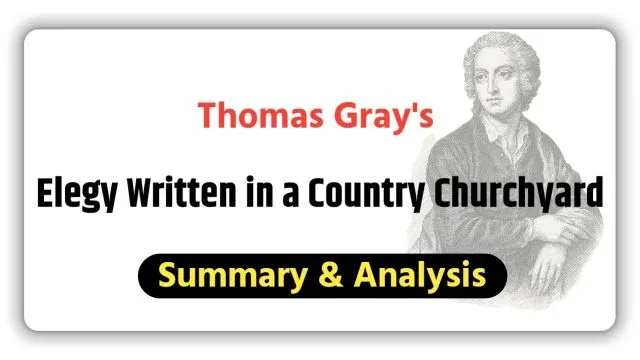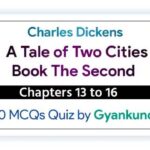Elegy Written in a Country Churchyard is the most celebrated poem of Thomas Gray, first published in 1751. This masterpiece of English literature is admired for its deep reflection on life, death, and the dignity of common people. Written in a quiet rural churchyard at evening, the poem captures the stillness of nature and the silence of graves, where both rich and poor lie side by side.
The poem is not only about mourning but also about equality before death. Gray highlights the “simple annals of the poor” and shows sympathy for their humble lives, which were often ignored in eighteenth-century poetry. Through its soft rhythm, balanced quatrains, and reflective mood, the poem combines Augustan elegance with the early spirit of Romanticism.
Elegy Written in a Country Churchyard remains one of the most quoted poems in the English language, with famous lines such as “The paths of glory lead but to the grave.” Its universal message, meditative tone, and touching imagery make it a timeless text for students, teachers, and literature lovers.
About the Poet: Thomas Gray (1716–1771)
Thomas Gray, born in Cornhill, London in 1716, was the only surviving child out of twelve. His father, a scrivener by profession, suffered from mental instability, so Gray was brought up mainly by his mother. He studied at Eton, where he formed a close friendship with Horace Walpole, and later joined Peterhouse, Cambridge. Though he became well known for his Latin poetry, he did not complete his degree.
In 1739, Gray travelled across Europe with Walpole, but their friendship broke for a while in 1741, and Gray returned alone. He then turned to the study of law and began a tragedy titled Agrippina, though he left it unfinished. The death of his close friend Richard West in 1742 deeply affected him and inspired a fresh burst of poetry. His first published work, Ode on a Distant Prospect of Eton College, was written in 1742 but published in 1747 without his name.
Gray lived mostly at Cambridge, first in Peterhouse and later at Pembroke College, except for a short stay in London (1759–61), where he studied in the British Museum. His friendship with Walpole was restored, and Walpole’s cat’s death inspired Gray’s witty and charming poem Ode on the Death of a Favourite Cat (1748).
It was during his stay at Stoke Poges with his mother and aunt that Gray began his most famous poem, Elegy Written in a Country Churchyard. He revised it carefully for years, and when it was published in 1751, it was immediately celebrated as a masterpiece. The poem quickly went through fifteen editions and became one of the most widely admired works of English poetry.
This Elegy is important in many ways. It shows Gray’s sensitive use of nature as background, the quiet churchyard scene, the melancholy mood, and the contrast between the peaceful country life and the restless city life. The poem also shows sympathy for the simple villagers and respect for the lives of the poor, reflecting the rising democratic spirit of the age. Although Gray still used some traditional Augustan techniques, the Elegy marked a turning point towards Romantic poetry.
In 1761, Gray wrote several poems inspired by Norse and Welsh traditions, such as The Fatal Sisters, The Descent of Odin, and The Triumphs of Owen. These poems, published in 1768, presented the poet not just as a skilled craftsman but as an inspired singer, showing the beginnings of Romantic enthusiasm.
In 1768, Gray became Professor of Modern History at Cambridge, though he never gave a single lecture. The next year, he visited the Lake District, and his travel journal (published after his death in 1775) records his deep response to its natural beauty. His letters also reveal him as a witty, intelligent, and entertaining personality.
Thomas Gray did not write much poetry, but whatever he wrote was of lasting value. His work reflects the changes in English literature of the eighteenth century. He began by following Alexander Pope’s style, moved on to conventional lyrical forms, reached perfection in Elegy Written in a Country Churchyard, and finally experimented with themes that clearly pointed towards Romanticism.
About the Poem: Elegy Written in a Country Churchyard
Elegy Written in a Country Churchyard is the most famous poem of Thomas Gray and one of the greatest poems of the eighteenth century. Gray began writing it in 1742 while staying at Stoke Poges with his mother and aunt, and after many revisions, it was published in 1751. The poem brought him instant fame and made him one of the best-loved poets of his time.
The poem is set in a quiet rural churchyard at evening, just as twilight falls. The poet reflects on the lives of the humble villagers who are buried there. He thinks about their “simple annals,” their struggles, joys, and sorrows, which remain unnoticed by the world. Although they never enjoyed wealth, power, or fame, their lives had dignity and value.
The Elegy is not only about death but also about equality in the face of death. It reminds us that both rich and poor, great and humble, must rest together in the same earth. Gray also expresses a democratic spirit by showing sympathy for ordinary people, which was a new and important development in English poetry.
The poem is also remarkable for its atmosphere. The soft picture of nature, the evening scene, the sound of the curfew bell, the grazing cattle, and the solemn silence of the churchyard all create a mood of meditation and melancholy. At the same time, the poem points towards the Romantic movement, as it values nature, emotion, and the common life of villagers.
With its smooth rhythm, tender feelings, and universal message, Elegy Written in a Country Churchyard continues to be admired as a true masterpiece of English poetry.
Text of Elegy Written in a Country Churchyard
The curfew tolls the knell of parting day,The lowing herd wind slowly o’er the lea,The plowman homeward plods his weary way,And leaves the world to darkness and to me.
Now fades the glimm’ring landscape on the sight,And all the air a solemn stillness holds,Save where the beetle wheels his droning flight,And drowsy tinklings lull the distant folds;
Save that from yonder ivy-mantled tow’rThe moping owl does to the moon complainOf such, as wand’ring near her secret bow’r,Molest her ancient solitary reign.
Beneath those rugged elms, that yew-tree’s shade,Where heaves the turf in many a mould’ring heap,Each in his narrow cell for ever laid,The rude forefathers of the hamlet sleep.
The breezy call of incense-breathing Morn,The swallow twitt’ring from the straw-built shed,The cock’s shrill clarion, or the echoing horn,No more shall rouse them from their lowly bed.
For them no more the blazing hearth shall burn,Or busy housewife ply her evening care:No children run to lisp their sire’s return,Or climb his knees the envied kiss to share.
Oft did the harvest to their sickle yield,Their furrow oft the stubborn glebe has broke;How jocund did they drive their team afield!How bow’d the woods beneath their sturdy stroke!
Let not Ambition mock their useful toil,Their homely joys, and destiny obscure;Nor Grandeur hear with a disdainful smileThe short and simple annals of the poor.
The boast of heraldry, the pomp of pow’r,And all that beauty, all that wealth e’er gave,Awaits alike th’ inevitable hour.The paths of glory lead but to the grave.
Nor you, ye proud, impute to these the fault,If Mem’ry o’er their tomb no trophies raise,Where thro’ the long-drawn aisle and fretted vaultThe pealing anthem swells the note of praise.
Can storied urn or animated bustBack to its mansion call the fleeting breath?Can Honour’s voice provoke the silent dust,Or Flatt’ry soothe the dull cold ear of Death?
Perhaps in this neglected spot is laidSome heart once pregnant with celestial fire;Hands, that the rod of empire might have sway’d,Or wak’d to ecstasy the living lyre.
But Knowledge to their eyes her ample pageRich with the spoils of time did ne’er unroll;Chill Penury repress’d their noble rage,And froze the genial current of the soul.
Full many a gem of purest ray serene,The dark unfathom’d caves of ocean bear:Full many a flow’r is born to blush unseen,And waste its sweetness on the desert air.
Some village-Hampden, that with dauntless breastThe little tyrant of his fields withstood;Some mute inglorious Milton here may rest,Some Cromwell guiltless of his country’s blood.
Th’ applause of list’ning senates to command,The threats of pain and ruin to despise,To scatter plenty o’er a smiling land,And read their hist’ry in a nation’s eyes,
Their lot forbade: nor circumscrib’d aloneTheir growing virtues, but their crimes confin’d;Forbade to wade through slaughter to a throne,And shut the gates of mercy on mankind,
The struggling pangs of conscious truth to hide,To quench the blushes of ingenuous shame,Or heap the shrine of Luxury and PrideWith incense kindled at the Muse’s flame.
Far from the madding crowd’s ignoble strife,Their sober wishes never learn’d to stray;Along the cool sequester’d vale of lifeThey kept the noiseless tenor of their way.
Yet ev’n these bones from insult to protect,Some frail memorial still erected nigh,With uncouth rhymes and shapeless sculpture deck’d,Implores the passing tribute of a sigh.
Their name, their years, spelt by th’ unletter’d muse,The place of fame and elegy supply:And many a holy text around she strews,That teach the rustic moralist to die.
For who to dumb Forgetfulness a prey,This pleasing anxious being e’er resign’d,Left the warm precincts of the cheerful day,Nor cast one longing, ling’ring look behind?
On some fond breast the parting soul relies,Some pious drops the closing eye requires;Ev’n from the tomb the voice of Nature cries,Ev’n in our ashes live their wonted fires.
For thee, who mindful of th’ unhonour’d DeadDost in these lines their artless tale relate;If chance, by lonely contemplation led,Some kindred spirit shall inquire thy fate,
Haply some hoary-headed swain may say,“Oft have we seen him at the peep of dawnBrushing with hasty steps the dews awayTo meet the sun upon the upland lawn.
“There at the foot of yonder nodding beechThat wreathes its old fantastic roots so high,His listless length at noontide would he stretch,And pore upon the brook that babbles by.
“Hard by yon wood, now smiling as in scorn,Mutt’ring his wayward fancies he would rove,Now drooping, woeful wan, like one forlorn,Or craz’d with care, or cross’d in hopeless love.
“One morn I miss’d him on the custom’d hill,Along the heath and near his fav’rite tree;Another came; nor yet beside the rill,Nor up the lawn, nor at the wood was he;
“The next with dirges due in sad arraySlow thro’ the church-way path we saw him borne.Approach and read (for thou canst read) the lay,Grav’d on the stone beneath yon aged thorn.”
Here rests his head upon the lap of EarthA youth to Fortune and to Fame unknown.Fair Science frown’d not on his humble birth,And Melancholy mark’d him for her own.
Large was his bounty, and his soul sincere,Heav’n did a recompense as largely send:He gave to Mis’ry all he had, a tear,He gain’d from Heav’n (’twas all he wish’d) a friend.
No farther seek his merits to disclose,Or draw his frailties from their dread abode,(There they alike in trembling hope repose)The bosom of his Father and his God.
Form, Meter and Rhyme Scheme of Elegy Written in a Country Churchyard
Form of Elegy Written in a Country Churchyard
Thomas Gray’s Elegy is written in heroic (or elegiac) quatrains — that means each stanza has four lines and the whole poem is made of many such quatrains. In total the poem has 128 lines, i.e. 32 quatrains, and the last few stanzas act like a short epitaph closing the poem.
Meter of Elegy Written in a Country Churchyard
Each line is written in iambic pentameter. That means each line normally has five iambs (an iamb = an unstressed syllable followed by a stressed syllable), so roughly ten syllables. This steady five-beat line gives the poem a calm, measured pace suitable for meditation and graveyard mood.
Rhyme scheme of Elegy Written in a Country Churchyard
Every quatrain follows an alternating rhyme pattern: ABAB (also written as abab). In other words, the 1st and 3rd lines rhyme with each other and the 2nd and 4th lines rhyme. This gentle, repeating rhyme helps create musical flow without sounding sing-song; it supports the elegiac, reflective tone.
Summary of Elegy Written in a Country Churchyard
The evening church bell signals the end of the day. Cows move slowly across the meadows, and a tired farmer goes home. Darkness spreads all around, and the speaker feels alone with nature. The village fields shine with the last light of sunset, but silence soon covers everything except for the buzzing of insects, the tinkling of sheep bells, and the cry of an owl in a distant ivy-covered tower.
Under the elm and yew trees lie the graves of simple villagers. These ordinary people, now dead, will never again hear the morning songs of birds, the crowing of the cock, or the sounds of the hunt. Their cottages will not welcome them anymore, their wives will not wait for them in the evenings, and their children will not run to greet them with joy.
In life, they worked hard in fields, ploughing land, cutting trees, and guiding their cattle. Their efforts were humble but valuable. Gray warns us not to laugh at their plain lives, because death is the same for both the rich and the poor. Neither wealth, power, nor beauty can save anyone from death.
Though these villagers had no grand tombs, statues, or decorated graves, their simple lives still held dignity. No monuments or flattering words can bring the dead back. Poverty limited their chances—it stopped them from becoming great rulers, poets, or leaders—but it also saved them from becoming cruel tyrants or corrupt leaders. Their lives remained innocent, away from the pride and violence of the powerful.
A few simple memorials, with rough carvings and biblical verses, remind us of their existence. These graves teach lessons about humility, faith, and the certainty of death. The speaker reflects that every human, whether rich or poor, desires remembrance and affection in death. Even the simplest grave can stir sympathy in the hearts of those who pass by.
Towards the end, Gray imagines how the villagers might one day describe him: a solitary man who loved to wander in the fields, sometimes happy, sometimes sad, lost in deep thoughts. Finally, they too carried him in a funeral procession to his resting place beneath a tree.
The poem closes with the speaker’s own epitaph. It tells us he was a man without wealth or fame, born to simple parents, and filled with sorrow. Yet he possessed a sincere heart and honest feelings. Heaven rewarded him not with worldly glory, but with the comfort of friendship and peace with God.
Critical Analysis of Elegy Written in a Country Churchyard
Thomas Gray’s Elegy Written in a Country Churchyard is one of the most important poems of the eighteenth century, admired for its balance of feeling and form. The poem meditates on death, memory, and the dignity of common life.
Gray begins with a calm evening scene that sets the mood of reflection. The curfew bell, the ploughman, and the quiet countryside create an atmosphere of stillness, suitable for a meditation on mortality. This quiet imagery gives the elegy a universal appeal and makes the reader enter a thoughtful frame of mind.
One of the strongest achievements of the poem is its treatment of death as the great equaliser. Gray reminds us that death does not spare anyone, whether poor villagers or mighty rulers. By placing the graves of humble farmers next to the imagined grandeur of kings, he underlines the truth that all human pride finally rests in the same earth.
Another significant aspect is the theme of unrealised potential. Gray’s famous line about the “flower born to blush unseen” suggests that many simple villagers may have possessed gifts of art, leadership, or thought, but poverty and lack of opportunity kept them hidden. This reflection brings sympathy for the poor and gives moral depth to the poem.
The elegy also raises questions about fame and remembrance. Gray accepts that not every life will be recorded in history, but he honours the quiet memory of ordinary people. The poem itself becomes their monument, keeping alive their dignity.
Stylistically, Gray achieves greatness through measured rhythm, musical rhyme, and plain language. The steady iambic pentameter and ABAB rhyme scheme suit the calm and serious tone. His language is free from ornament yet rich in suggestive images, which gives the elegy both simplicity and grandeur.
Critics often see Gray’s elegy as a bridge between classical restraint and romantic feeling. While his control of form belongs to the Augustan tradition, his sympathy for nature and common men points forward to Wordsworth and the Romantics.
Quiz on : Elegy Written in a Country Churchyard MCQ Quiz : 20 Questions
Discover more from Gyankundli
Subscribe to get the latest posts sent to your email.














1 thought on “Elegy Written in a Country Churchyard : Summary and Analysis”